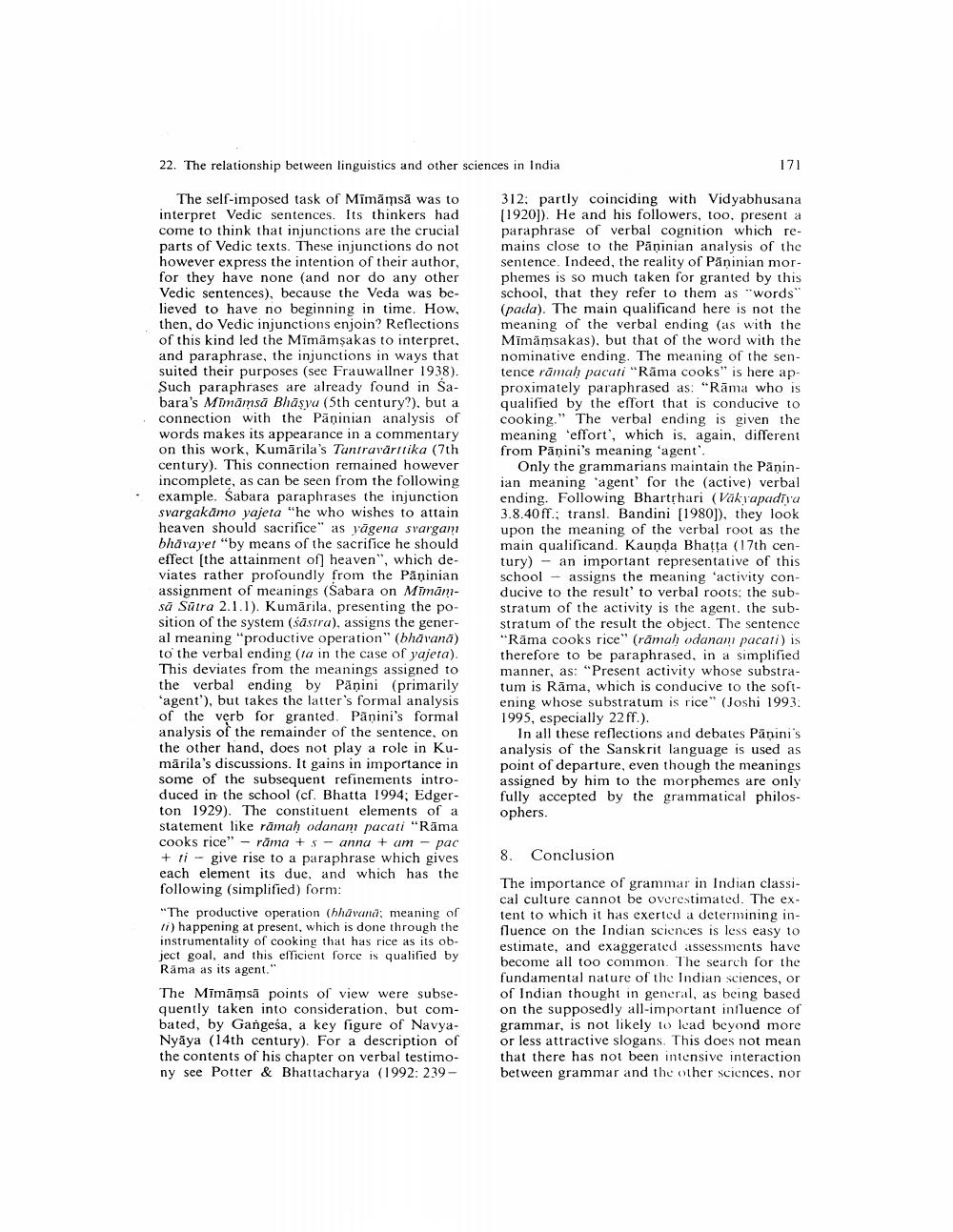Book Title: Relationship Between Linguistics And Other Sciences In India Author(s): Johannes Bronkhorst Publisher: Johannes Bronkhorst View full book textPage 6
________________ 22. The relationship between linguistics and other sciences in India 171 The self-imposed task of Mīmāmsă was to interpret Vedic sentences. Its thinkers had come to think that injunctions are the crucial parts of Vedic texts. These injunctions do not however express the intention of their author, for they have none (and nor do any other Vedic sentences), because the Veda was believed to have no beginning in time. How, then, do Vedic injunctions enjoin? Reflections of this kind led the Mimämşakas to interpret, and paraphrase, the injunctions in ways that suited their purposes (see Frauwallner 1938). Such paraphrases are already found in Sabara's Mimāmsā Bhāşvu (5th century?), but a connection with the Pāninian analysis of words makes its appearance in a commentary on this work, Kumārila's Tantraväritika (7th century). This connection remained however incomplete, as can be seen from the following example. Sabara paraphrases the injunction svargakāmo yajeta "he who wishes to attain heaven should sacrifice" as pāgena svargam bhävayet "by means of the sacrifice he should effect [the attainment of heaven", which deviates rather profoundly from the Paninian assignment of meanings (Sabara on Mimanisā Sūtra 2.1.1). Kumārila, presenting the position of the system (Šāstra), assigns the general meaning "productive operation" (bhavana) to the verbal ending (ta in the case of yajeta). This deviates from the meanings assigned to the verbal ending by Panini (primarily 'agent'), but takes the latter's formal analysis of the verb for granted. Panini's formal analysis of the remainder of the sentence, on the other hand, does not play a role in Kumärila's discussions. It gains in importance in some of the subsequent refinements introduced in the school (cf. Bhatta 1994; Edgerton 1929). The constituent elements of a statement like rāmah odanam pacati "Rāma cooks rice" - rāma + $ - anna + am - pac + ti - give rise to a paraphrase which gives each element its due, and which has the following (simplified) form: "The productive operation (hhavana; meaning of ri) happening at present, which is done through the instrumentality of cooking that has rice as its object goal, and this efficient force is qualified by Rama as its agent." The Mīmāmsā points of view were subsequently taken into consideration, but combated, by Gangesa, a key figure of NavyaNyāya (14th century). For a description of the contents of his chapter on verbal testimony see Potter & Bhattacharya (1992: 239 312; partly coinciding with Vidyabhusana [1920]). He and his followers, too, present a paraphrase of verbal cognition which remains close to the Pāņinian analysis of the sentence. Indeed, the reality of Paninian morphemes is so much taken for granted by this school, that they refer to them as "words" (pada). The main qualificand here is not the meaning of the verbal ending (as with the Mimämsakas), but that of the word with the nominative ending. The meaning of the sentence rămah pacati "Räma cooks" is here approximately paraphrased as: "Rāma who is qualified by the effort that is conducive to cooking." The verbal ending is given the meaning 'effort', which is, again, different from Pāṇini's meaning agent'. Only the grammarians maintain the Paninian meaning agent for the (active) verbal ending. Following Bharthari (Väkrapadiva 3.8.40 ff.; transl. Bandini [1980]), they look upon the meaning of the verbal root as the main qualificand. Kaunda Bhatta (17th century) - an important representative of this school - assigns the meaning 'activity conducive to the result' to verbal roots; the substratum of the activity is the agent. the substratum of the result the object. The sentence "Rāma cooks rice" (rāmah odanam pacati) is therefore to be paraphrased, in a simplified manner, as: “Present activity whose substratum is Rāma, which is conducive to the softening whose substratum is rice" (Joshi 1993: 1995, especially 22 ff.). In all these reflections and debates Panini's analysis of the Sanskrit language is used as point of departure, even though the meanings assigned by him to the morphemes are only fully accepted by the grammatical philosophers. 8. Conclusion The importance of grammar in Indian classical culture cannot be overestimated. The extent to which it has exerted a determining influence on the Indian sciences is less easy to estimate, and exaggerated assessments have become all too common. The search for the fundamental nature of the Indian sciences, or of Indian thought in general, as being based on the supposedly all-important influence of grammar, is not likely to lead beyond more or less attractive slogans. This does not mean that there has not been intensive interaction between grammar and the other sciences, norPage Navigation
1 ... 4 5 6 7 8
